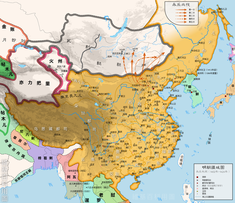
Emperors of Ming - Part 1
Last updated: Friday November 5th, 2021
Report this blog
Introduction
Hello all. It's been a while.
I have thought about making this blog for some time now. For the past 20 months, I've been actively using this website, and the fact that there is a lack of content on my culture sort of disappoints me. Hence, I thought, I might as well invest some of my time to contribute to this.
Some relevant information: Ming (1368-1644) was the last ethnic Han dynasty to rule over all of China proper. During its early stages, the Chinese civilization thrived in technology, economy and culture. But, with all the instability in its late stages, corruption, factionalism within the bureaucracy, et cetera caused the Chinese civilization to lag behind the emerging European powers.
Alright, let's not waste more of your time...
Note: The headers represent the era names of China and the time is the period during which that particular emperor reigned. All emperors but one, Yingzong, had only one era name. That will be explained in details down below. And, of course, this blog will not only talk about emperors themselves.
Hongwu (1368-1398)
Zhu Yuanzhang (1328-1398), more commonly known as Hongwu, was the first Emperor of Ming. Founding emperors generally did not have a tough early life, as most were sons of nobles and officials. However, that did not apply to Zhu Yuanzhang. Interestingly, he was the only founder of a major Chinese dynasty who was born a peasant. His youth was by no means easy. Most of his family succumbed to a famine when he was a teenager and he sought refuge at a local Buddhist monastery.
Years later, the monastery he stayed at was destroyed by an army suppressing a revolt. At the time, the Yuan dynasty was heavily corrupted and began to lose its grip on China. Eventually, Zhu joined a force of rebels. He quickly climbed up the ranks and became the leader of his force, which later joined the Red Turbans.
A few years in, in 1356, he successfully conquered Jiqinglu (present-day Nanjing). With a major city under his control, Zhu became an indisputably powerful force amongst all rebels. Previously, in the 13th century, the Jurchen and subsequent Mongol invasions caused the focus of the Chinese economy to shift southward. With this, his faction was able to quickly stock up on resources, and in the next few years, he was able to defeat other warlords such as Zhang Shicheng (1321-1367) and Chen Youliang (1320-1363) and unify China. On 20 January 1368, he proclaimed himself Emperor of Ming and adopted the era name "Hongwu".
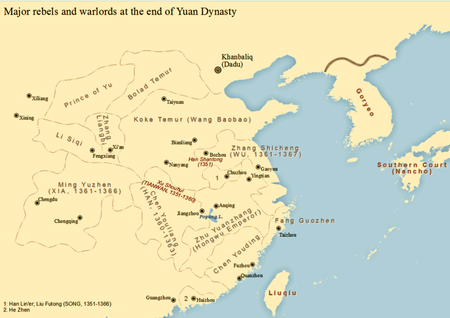
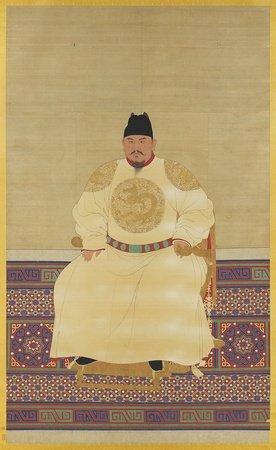
Despite being one of the most well-respected emperors in Chinese history, Hongwu was undoubtedly a ruthless leader. During his reign, he executed many officials, generals and nobles. With his newfound power, he grew incredibly paranoid of people around him. He introduced the Da Gao, which drastically raised the punishment for crimes, with over 1,000 crimes eligible for capital punishment. For this reason, whether he was a good emperor has always been a hot topic up for debate.
On the other hand, he was not as cruel towards the common people. Instead, it was likely that his policies favored the commoners as he was formerly part of them, too. The Code of Great Ming took inspiration from legislation systems of other dynasties such as Tang and Han. However, unlike the Tang code, the Ming code ensured better treatment of peasants and slaves. In the past, slaves were considered no more than domestic animals, and if a slave was to be killed, there were no sanctions imposed on the killer by law. Also, overall, the Ming legal system was primarily targeted at potentially corrupt officials. Hongwu specifically ordered that the code should be comprehensible in order avoid exploitation of loopholes through intentional misinterpretation.
The Red Turbans followed several religions, and this may have inspired Ming's relative openness to various religious practices. A lot of beliefs were newly recognized by the state, and he even gave orders to construct mosques in numerous areas. Unfortunately, that's about the greatest extent of that. The Ming code included sinicization policies that required Mongol and Muslim Turkic women to marry Han Chinese men.
Surprisingly, Zhu Yuanzhang inherited the Mongol practice of executing concubines that did not bear a child for the Emperor. This tradition was already abolished by the Chinese centuries and perhaps even over a millennium ago, yet it was magically revived. At Hongwu's funeral, at least 38 of his concubines were sacrificed. This was another major reason why he was frowned upon by historians as well as enthusiasts.
Jianwen (1398-1402)
The Jianwen Emperor (1377-?), born Zhu Yunwen, was the second Emperor of Ming and a grandson of Hongwu. Now, you may ask: Why did he become the second emperor when Hongwu literally could've passed the throne to his eldest son? What actually happened was that Hongwu really liked his first son, Zhu Biao (1355–1392), who supposedly died of a wind chill at age 36. As he outlived his favorite son, he thought that Zhu Yunwen could potentially be a great emperor, and that making him the successor would only be fair.
The good times did not last. As he grew more and more insecure, he began demoting and even executing his powerful uncles. A year into his reign, one of his uncles, Zhu Di (1360-1424), revolted under the name of "清君侧", which literally means "to clear the monarch's sides (of corruption)". This eventually evolved into a 3 year civil war, commonly known as Jingnan campaign. Eventually, Yingtian (name for Nanjing during the Ming dynasty) fell to the Yan forces in 1402. Hopeless, the Jianwen Emperor set the palace on fire and forever disappeared.
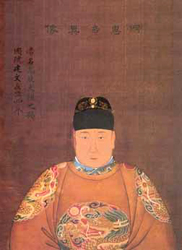
Portrait of the Jianwen Emperor
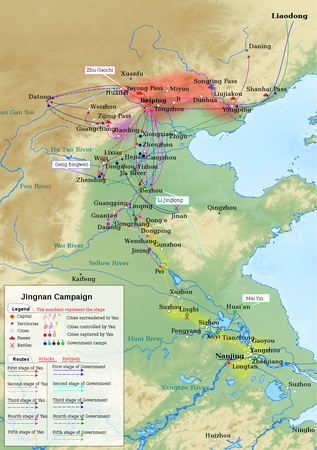
Yongle (1402-1424)
Shortly after the disappearance of Zhu Yunwen, he was declared to be dead and Zhu Di rose to the throne as the victor. He adopted the era name "Yongle", which means "perpetual happiness". Since he rose to power through rebellion, his legitimacy is certainly to be questioned. Knowing this, he voided the Jianwen era and modified and destroyed large amounts of records made during those four years.
With Yingtian in ruins, Yongle decided to re-establish Beiping (present-day Beijing), which was also the capital of his princedom, as the imperial capital. He reopened the Grand Canal and ordered the construction of the Forbidden City. When the construction was finally completed in 1420, the capital was officially relocated to the city of Beiping.
Yongle's contributions were certainly great. He expanded the imperial examination system and promoted classical culture. During his reign, scholars that performed well in the imperial exams were appointed to create what is now known as the Yongle Encyclopedia, which, in fact, was the largest general encyclopedia until it was surpassed by Wikipedia in 2007. However, this probably still was not the greatest accomplishment during his reign. The Ming's treasure fleet was initially ordered to be constructed in 1403 and made its first voyage in 1405, putting Chinese power and wealth on display. These voyages, led by Zheng He (1371-1433/1435), established the tributary system and thus trade between China and the rest of the Old World.
One big problem with Yongle though, as with the previous two emperors, was that he was too paranoid. This eventually led to the rise to power of the Jingyiwei, which was infamous for power abuse. Initially, this group was established by Zhu Yuanzhang, who then reduced their duties and power as they allegedly abused their authority during the investigation of a rebellion plot. But, the fact that Zhu Di overthrew his nephew concerned him as his subjects might've been discontented with him. Hence, he restored the former powers of the Jingyiwei in order to hush and simultaneously spy on his subjects
The Emperor personally led several military campaigns against the Mongols. In one such operation in 1424, he was heavily frustrated as he was unable to catch up to the swift Mongols. This caused him to fall ill, and eventually, drove him to eternal sleep.
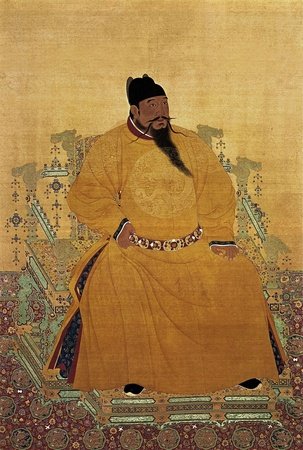
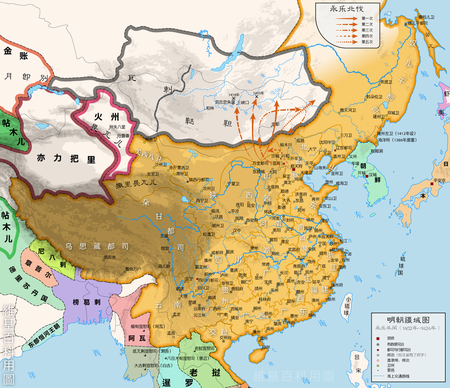
Hongxi (1424-1425)
Soon after Yongle Emperor died, his eldest son, Zhu Gaochi (1378-1425) was enthroned as the Hongxi Emperor. He immediately called off several activities and missions left from his father's era, and had likely burnt the Ming fleet. He introduced several new policies that improved the life of the average citizen and seemed to be a pretty good emperor overall. Nothing much to say about him, as his reign was rather short, lasting a grand total of a bit over 8 months.
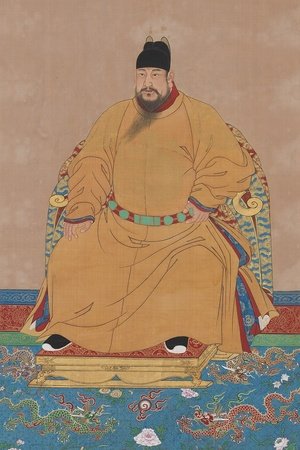
Now you may be wondering, why was his era so short-lived? Hongxi was definitely one of the fattest emperors in Chinese history. As a child, he had no interest in martial arts and thus barely exercised. This was obviously not great for his health. Obesity was and still is one leading cause of death among the rich, and that didn't serve the Emperor too well. In 1425, just a couple months into his reign, he passed away suddenly in the Qin'an Palace within the Forbidden City, likely to a heart attack.
Xuande (1425-1435)
In 1425, about a month after his father's death, Zhu Zhanji (1399-1435) was crowned the Xuande Emperor. He was the eldest son of the Hongxi Emperor. As a child, his grandfather, the Yongle Emperor, had always had high hopes for him. That was one reason why Yongle decided to hand his eldest son the throne despite the fact that the two did not agree with one another politically.
Yongle's favorite child was actually not the later Hongxi Emperor, but rather his second son, Zhu Gaoxu (1380-1426). Nonetheless, he never got to touch the throne, which certainly infuriated him. Thus, he began secretly gathering and training his forces in Shandong. Just a year into the Xuande era, Zhu Gaoxu attempted what his father had pulled off over two decades ago.
Unlike the Yongle Emperor though, his attempt was not successful. The Xuande Emperor himself led troops to attack his uncle. It also did not help that a general betrayed Gaoxu and turned to attack the rebel forces instead. Soon enough, the rebel forces were defeated and Zhu Gaoxu had to surrender. His former glory was thus ripped away and he was now no more than a commoner.
The Emperor was kind enough to not have his uncle killed immediately. According to a theory, when Xuande visited his uncle, Zhu Gaoxu intentionally tripped the Emperor. He was then executed along with his sons through fire torture.
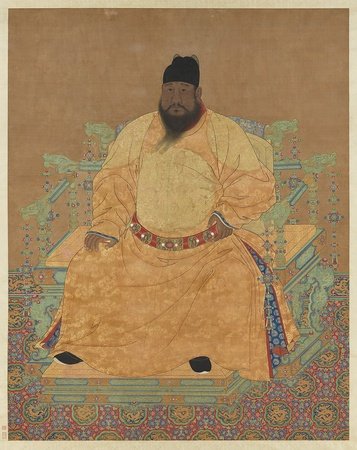
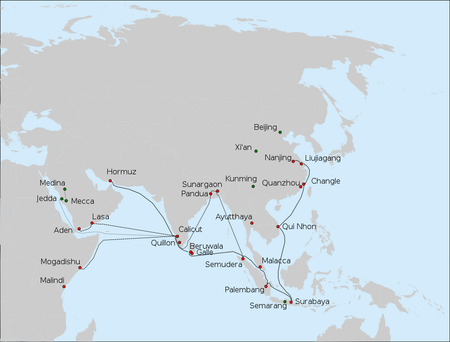
The Xuande Emperor generally followed his grandfather's ways. He restored the Ming expeditions and permitted Zheng He to go on his seventh and last journey. This act once again promoted trade between Ming and its tributary states across Asia and Africa.
Back in 1407, during the Yongle era, Northern Vietnam was taken over by Ming and briefly became the Jiaozhi Province. The locals obviously were not happy about the situation. Several revolts happened in the next two decades. When the Xuande Emperor took power, he did not wish to waste more time with the Vietnamese and instead simply withdraw his troops from Jiaozhi. Some of his advisors disagreed and thus this did not happen until their armies were badly defeated by the Vietnamese. Eventually, the Great Ming had to cede this territory and recognize the independence of its new Southern neighbor - the Lê dynasty.
The Emperor died 10 years into his reign, at age 36. Apart from the Gaoxu rebellion in the first year, his era was relatively peaceful. Trade flourished and this certainly strengthened the grasp of the Zhu family over China... Though not for long.
Zhengtong (1435-1449)
Following his father's death, Zhu Qizhen (1427-1464), more commonly known as Emperor Yingzong of Ming, rose to the throne and was crowned Zhengtong Emperor. The Ming dynasty was still at its height, thanks to the stability left over from the Xuande era. As the emperor was still young, political power was mainly in the hands of the "Three Yangs". The empire was doing really well under their control. But, as they eventually died, and as the Emperor himself took power, he was overly influenced by a eunuch named Wang Zhen.
As you can probably tell, it didn't end well. In 1449, advised by Wang Zhen, the Emperor personally led a campaign against the Oirats up north as he desperately wanted to mark himself down as a warrior monarch in history. However, he never considered how inexperienced he was as a military leader. His troops actually outnumbered his foes' at an estimated 25 : 1. Yet, the Ming forces lost terribly. Wang Zhen was killed, and Yingzong was captured by the Mongols. Instead of an honorable mark in history, the shameful loss of Tumu Crisis landed a loud and humiliating slap on Yingzong's face.
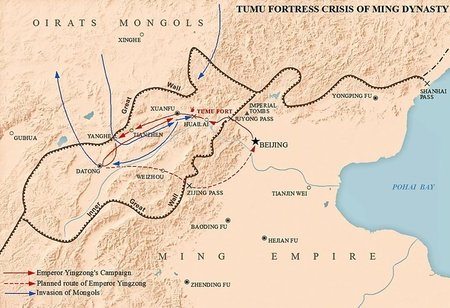
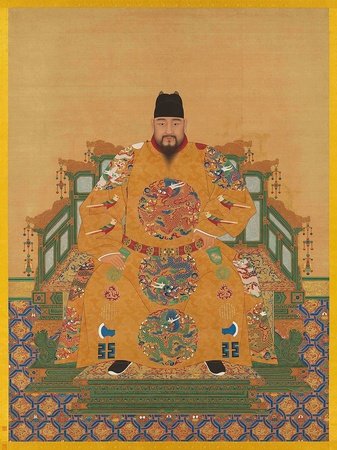
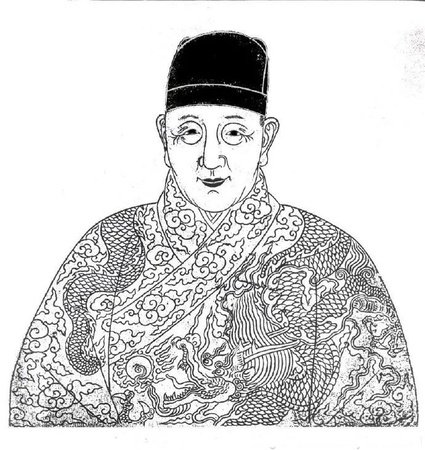
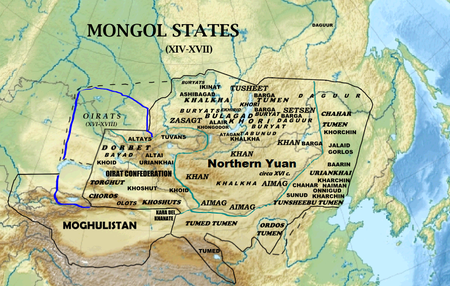
Jingtai (1449-1457)
With Yingzong captivated by the Oirats, the Ming's cover was suddenly shattered, and their political instability was put on full display. Yu Qian (1398-1457), the Minister of War at the time, supported Zhu Qiyu (1449-1457) to take the throne in the chaos, who then adopted the era name "Jingtai". Later, Yu fiercely defended Beijing against waves of Mongol attacks and was eventually able to drive them back and have their leader, Esen Taishi, sign a peace treaty with Ming. For this, Yu Qian was appointed as the Crown Prince's Guardian and Tutor.
Just a year later, the Emperor's older brother, Yingzong, was released by the Oirats. As soon as he returned to China, the Jingtai Emperor immediately put him under house arrest, and he was made Taishang Huang. Jingtai also gave his own son, Zhu Jianji (1448-1453), the title of Crown Prince, which really angered his brother. But, soon afterwards, his son mysteriously passed away. This deeply saddened the Emperor, who then fell ill.
Yingzong saw this as an opportunity. He threw a coup d'état, and successfully seized the throne back from his younger brother. Yingzong demoted Jingtai to his previous title, Prince of Cheng, and placed him under house arrest just like what had happened to him. A month later, Zhu Qiyu, the former Jingtai Emperor, suddenly died. The exact reasons were not known, but rumors were that Yingzong himself ordered an assassination.

Portrait of the Jingtai Emperor
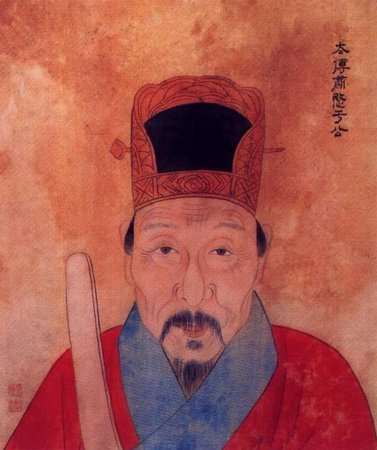
Tianshun (1457-1464)
After reclaiming his throne, Zhu Qizhen adopted a new era name - "Tianshun". He falsely accused Yu Qian of treason, and executed him just 5 days in. Shortly before his execution, Yu Qian left a famously great poem called "石灰吟", which can be translated to the Limestone Chant. See the hyperlink for details.
Yingzong chose to deny his brother's rights to be buried at the Ming tombs. Instead, he was buried in the hills west of the capital and as a prince, not an emperor.
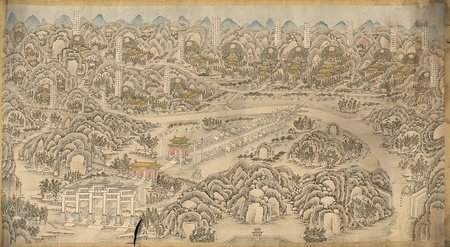
In the summer of 1461, yet another rebellion broke out in Beijing. Cao Qin (?-1461) and his comrades attempted to overthrow Yingzong by storming the imperial palace with the help of his adoptive father, Cao Jixiang (?-1461). He murdered Lu Gao (?-1461), the commander of the Jingyiwei, as well as a couple other officials. However, his luck was not exactly great. Like what happened with Zhu Gaoxu earlier, one of his generals betrayed him. But, unlike in the Gaoxu Rebellion, that general did not turn against him in the fight. He defected and leaked the revolt to the Emperor due to fear.
When the battle broke out, the Minister of Works was killed the the gates were set on fire by the rebels. Later that day, three of Cao Qin's brothers also perished in the onslaught, and Cao Qin himself was severely wounded. His adoptive father, Cao Jixiang, was also captured. Knowing that he wouldn't live for much longer regardless, he committing suicide by jumping down the well at his place. His extended family and the rest of the rebels were soon taken down and executed.
The Emperor passed away of an undocumented illness in 1464, at the age of 36. Prior to his death, he gave an order that ended the practice of sacrificing concubines and palace maids at the emperors' funerals. Arguably the best thing he did during his reigns.
Alright, that will be it. This took me really long to write, so thanks a lot if you've made it till the end. Part 2 probably will be even longer and my best guess is that it will not be coming out too soon, especially since I've been fairly busy with school lately. But, I assure that I will try my best to release it ASAP.
See y'all
Credits: Wikipedia, Baidu Baike, this YouTube video (in Mandarin, without captions in English)
